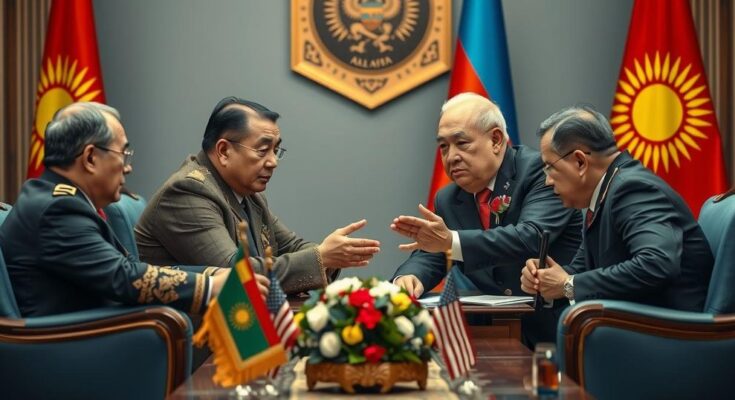Kassym-Jomart Tokayev’s state visit to Mongolia, the first by a Kazakh president in 16 years, is pivotal for revitalizing bilateral relations. Despite a historical pause due to Mongolia’s political instability, Kazakhstan now seeks to bolster strategic ties and trade, aiming for $500 million in turnover while signing significant agreements in space technology and nuclear energy. The visit signals a new era for cooperation benefiting both nations.
Kassym-Jomart Tokayev’s recent state visit to Mongolia marked a significant diplomatic milestone, being the first such visit by a Kazakh president in 16 years. This visit underscores Kazakhstan’s commitment to revitalizing its strategic partnerships in the region, particularly with Mongolia, while acknowledging a long-standing Kazakh diaspora within the nation. Despite Kazakhstan and Mongolia having established diplomatic relations over 32 years ago, ties had stagnated during the presidency of Nursultan Nazarbayev, largely due to Mongolia’s political instability, particularly protests seen in 2008, which had transcended beyond its borders amidst fears of regional upheavals. With a population of approximately 3.4 million, Mongolia represents a unique opportunity for Kazakhstan, especially given the sizable Kazakh community which exceeds 117,000 individuals. Tokayev’s discussions with Mongolian President Ukhnaagiin Khurelsukh focused on enhancing their bilateral relationship to reach the level of strategic partnership. The visit coincided with a gradual revival of economic exchanges, evidenced by increased trade turnover in recent years, rising from a mere $29.3 million in 2020 to an impressive $150 million by the end of 2023. During a joint press briefing, President Tokayev announced an ambitious trade goal of $500 million in the foreseeable future, reflecting optimism regarding the strengthened ties. Moreover, the Kazakh delegation leveraged this opportunity to sign several key agreements, including one focused on a collaborative satellite program, marking Kazakhstan’s inaugural venture into space technology. The visit also resulted in a memorandum between Kazakhstan’s Ministry of Energy and Mongolia’s Atomic Energy Commission to foster cooperation in nuclear energy development, where Mongolia seeks to replicate Kazakhstan’s advancements in this sector. Rustem Mustafin, Deputy Director at the Center for Political Studies at Kazakhstan’s Institute for Philosophy, Political Science and Religious Studies, highlighted additional achievements from the visit, particularly the agreement on joint exploration of critical minerals like iron, bauxite, and rare earth materials. He articulated the pressing global demand for such materials, noting, “The demand for critical raw materials worldwide is growing rapidly, especially those used in producing electronic high-tech products.” He emphasized potential collaborative efforts between the two countries to improve foreign investment opportunities and stimulate high-tech industries.
The diplomatic encounter between Kazakhstan and Mongolia has historical roots, originating from over three decades of bilateral relations. However, a notable withdrawal in relations occurred during former President Nursultan Nazarbayev’s tenure, primarily due to perceived risks associated with Mongolia’s internal political climate. This extended hiatus has had implications for the Kazakh diaspora residing in Mongolia, which has thrived despite the limited formal engagement between the two governments. Tokayev’s visit is seen as a recalibration of Kazakhstan’s foreign policy focus, particularly towards partnerships that leverage shared cultural and historical ties, especially with the Kazakh minority community in Mongolia, while also enhancing economic collaboration amidst shifting geopolitical dynamics.
In summary, Kassym-Jomart Tokayev’s recent visit to Mongolia not only rejuvenates a long-dormant partnership but also opens doors for significant economic and technological cooperation between the two nations. With ambitious trade goals, strategic agreements, and the potential for joint ventures in critical mineral exploration and nuclear energy, this visit symbolizes a critical step towards the renaissance of ties in Central Asia. Both countries stand to gain from the expanded partnership as they navigate a rapidly evolving regional landscape, making this diplomatic outreach a cornerstone for future collaboration.
Original Source: timesca.com




